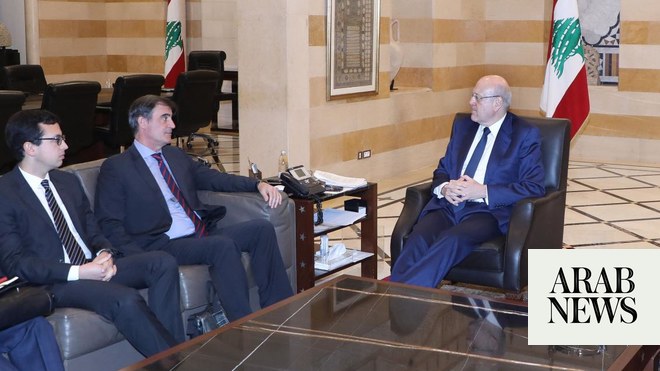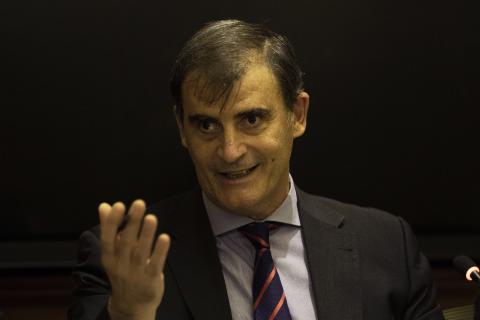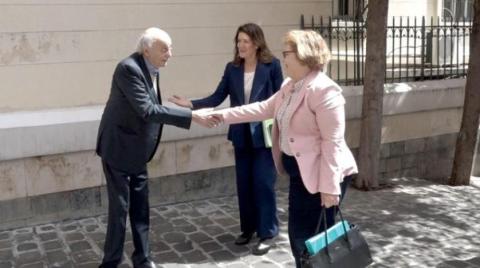
A year after Lebanese authorities committed to reforms ‘one would have expected more in terms of implementation and approval,’ says IMF mission chief
BEIRUT: “Lebanon is in a very dangerous situation,” the International Monetary Fund warned on Thursday, a year after authorities in the country committed to a program of reforms they have failed to implement.
The financial agency urged “the Lebanese government to halt borrowing from the central bank.” And the IMF’s mission chief to Lebanon, Ernesto Rigo, said during a news conference in Beirut that authorities must accelerate their efforts to meet the conditions required for a $3 billion bailout plan.
“One would have expected more in terms of implementation and approval of the legislation” relating to economic reforms, he said, noting that progress has been “very slow.”
Members of the IMF mission have spent nearly a month in Lebanon, during which they met many Lebanese officials and diplomats in an attempt to persuade them to step up efforts to introduce the reforms they had promised.
“We were expecting more in terms of adopting and implementing legislation aimed at reforming Lebanon’s financial system,” said Rigo. “The final draft of the Capital Control Law does not meet the objectives and needs to be amended.”
Lebanon signed an agreement with the IMF nearly a year ago but has yet to meet the conditions necessary to secure the full financial assistance program that is widely viewed as crucial to the country’s recovery from one of the worst economic crises the world has ever seen.
The economy has been crippled by the collapse of the nation’s currency, which has lost about 98 percent of its value against the US dollar since 2019, resulting in triple-digit inflation, soaring levels of poverty, and a massive wave of emigration.
Caretaker Prime Minister Najib Mikati was among the Lebanese officials who met the IMF team. “The mission presented the outcome of the consultations it carried out in Lebanon,” his office said.
During a meeting with Nabih Berri, the speaker of the Lebanese parliament, on Thursday, Mikati stressed the need for swift emergency action to save the country.
“The government cannot play its role amid a presidential vacuum and a dysfunctional parliament,” Mikati said. Politicians have been unable to agree on a replacement for President Michel Aoun, whose term ended on Oct. 31.
The Lebanese public took to the streets again on Wednesday to protest against the continuing deterioration in their finances and living conditions. Retired soldiers, who staged demonstrations this week because their pensions are no longer worth enough for them to live on, said they will resume their protests on Monday if their demands for assistance are not met.
On Thursday, employees of state-owned telecoms company Ogero decided to strike, raising fears that communications services and the internet could be crippled in the country.
After a meeting with Sheikh Abdel Latif Derian, Lebanon’s Grand Mufti, Prime Minister Mikati said: “We are fully aware of the difficult living situation that all of Lebanon is experiencing. We sent all draft laws to parliament for approval to initiate a practical workshop and major reforms in order to restore the active economic movement so that we can save what we can still save despite these difficult circumstances.”
However, the political squabbling continues over the election of a new president and other issues.
MP Ziad Hawat appeared on Thursday before First Investigative Judge Nicolas Mansour, after Mount Lebanon Public Prosecutor Judge Ghada Aoun accused Hawat of libeling, defaming and threatening a judge.
Hawat said he was waiving his parliamentary immunity to “challenge the politicized judiciary at its own game.”
In February, he accused Judge Aoun of violations he said could destroy the country’s banking institutions. “The entire banking system cannot be at the mercy of a judge’s mood,” Hawat said at the time, stressing his support for a fair and impartial judicial investigation into the operation of the country’s banks.









